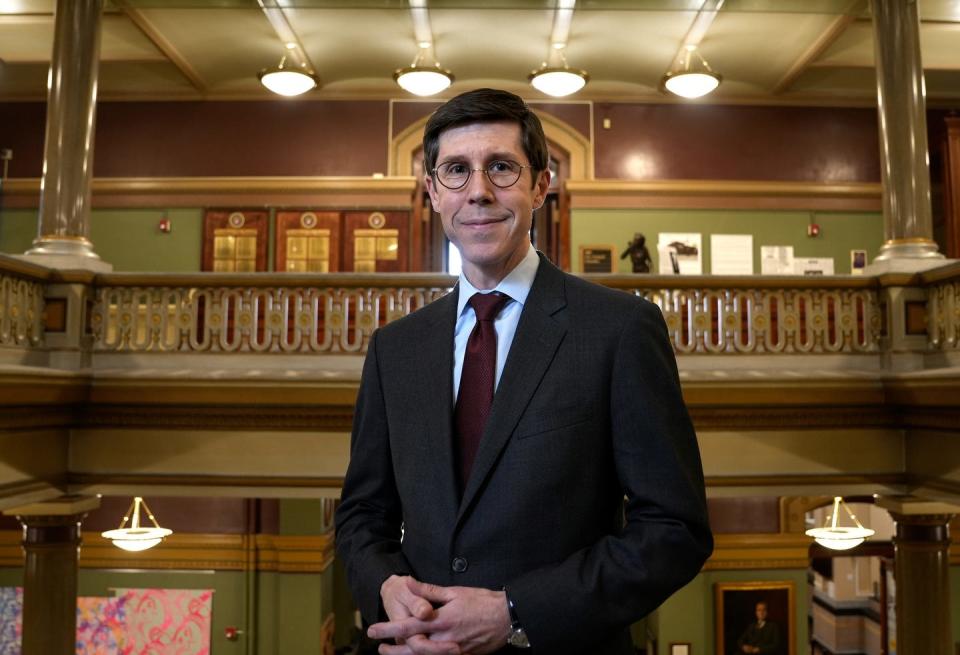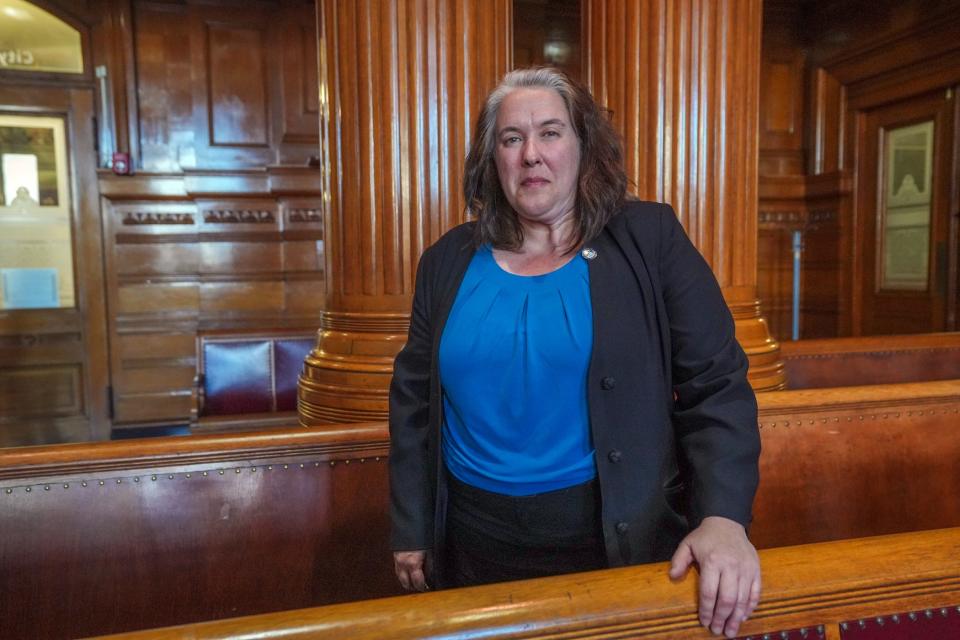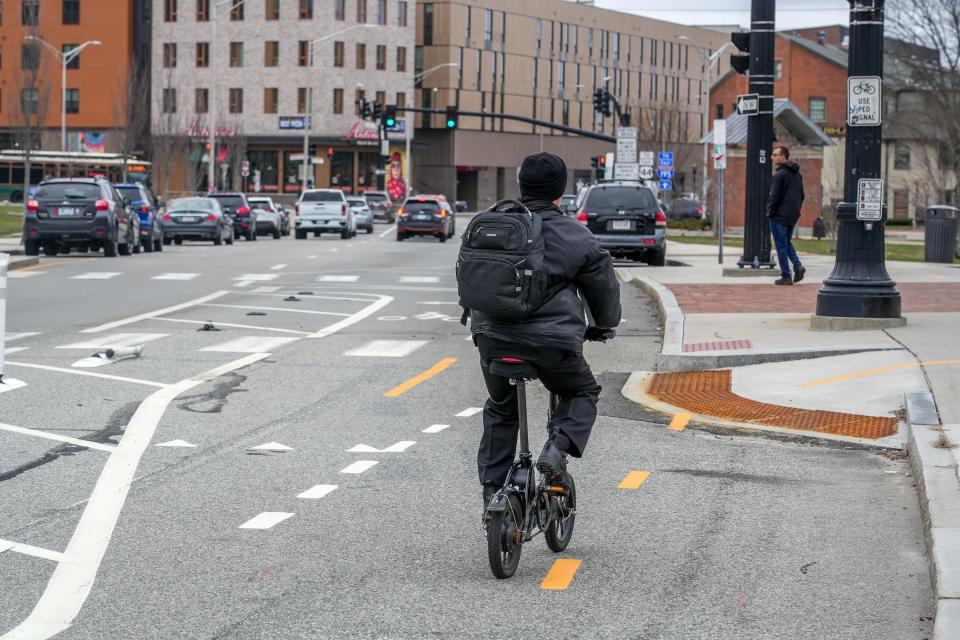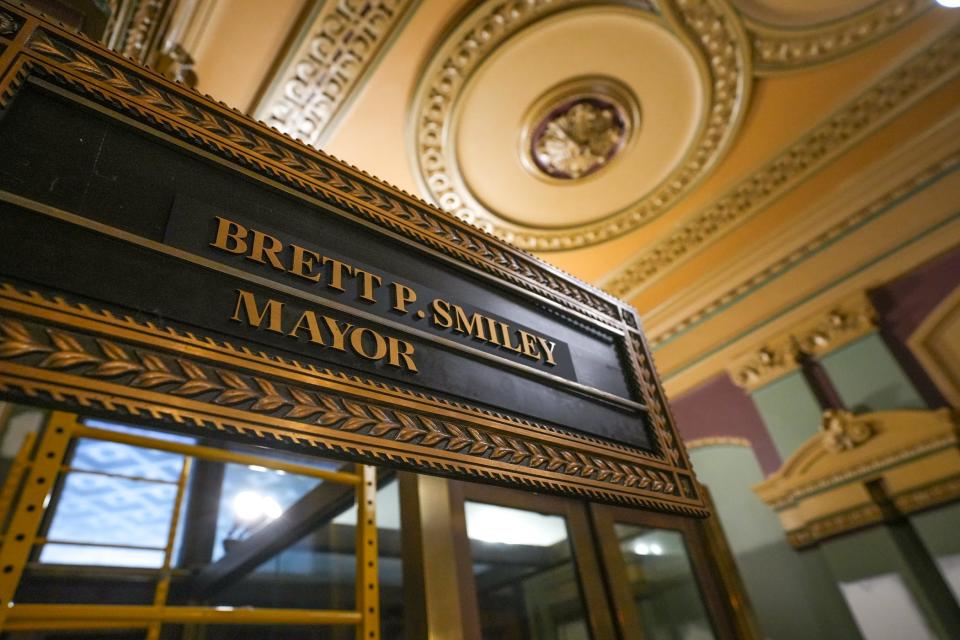Providence mayor, City Council keep clashing. Is it healthy government – or dysfunction?
PROVIDENCE – Mayor Brett Smiley has only been in office a little more than a year, but he has already faced off with the City Council on a host of major issues.
Among them: Should a wealthy developer get special tax breaks meant for affordable housing? Should bike lanes be torn up to make room for more cars? Should taxpayer dollars be spent prosecuting Brown University students involved in last year's pro-Palestine protests?
At each turn, the council and the mayor have butted heads, with each side trying to outmaneuver the other in the form of resolutions, press statements, legislation and even legal action.
But City Council President Rachel Miller insists it's all part of a healthy government.
Here's how the two branches have come into conflict lately, and why.
Where it started: Battle over Buff Chace's tax breaks
In a long, complicated and still-developing legal saga, council members decided last year they wanted to scrap special tax breaks given to wealthy developer Arnold "Buff" Chace meant to support low-income housing.

City Solicitor Jeff Dana issued those breaks under former Mayor Jorge Elorza without any approval from the council, tax assessor or other authorities. Those breaks fall under 8-law, a provision meant to spur low-income housing development, though the council suspects they were improperly given to 10 of Chace's buildings downtown that are not 100% affordable.
With the help of noted attorney Max Wistow, the council has for months been trying to undo the tax breaks in court. But before the council went to court, Smiley privately attempted to negotiate amendments to the tax agreements with Chace directly.
The case has since stalled in court, and it may be two months until there's another hearing.
More: In explosive court filing, Providence City Council lawyer accuses solicitor of corruption
Then, a veto and allegations of slander
As that push and pull plays out, the Council is once again butting heads with Smiley over a change to 8-law to close the loophole that allowed Chace to get the tax breaks.
Both the Council and the mayor agree the law needs to be narrowed, but they disagree on how how to do it – locally with the council or at the state level with the legislature.
The council passed an ordinance that would make 8-law applicable only in cases where all tenants make 80% or less of area median income and the rent is 30% or less of their income. Separately, the mayor has been lobbying for state legislation that would, as he put it, "apply only to affordable residential units and include new construction," while also using the 80% measure the council supports.
As Smiley advocates for that law, he vetoed the council's ordinance. But that wasn't the end.

Miller had thought she had enough support to push past Smiley's roadblock. But after heated conversation between councilors at their Thursday meeting, the vote was "laid on the table," or delayed, for two weeks.
"I think that the city has an obligation, and absolutely it’s within our rights to say how this very particular state law designed to protect access to low-income housing should be used," Miller said ahead of the meeting. "And I think we’re going to work together with the administration on putting forth some rules and regulations around that in future months."
In a pointed letter to the full council, Miller addressed the veto and what she described as a "slanderous" claim from the mayor that the ordinance would be retroactive, or would revoke tax breaks, including those given to Chace.
Miller called that "false and baseless" and said "the new ordinance will only apply in the new tax year," not retroactively.
Meanwhile, bike lanes divide mayor and City Council further
While the two sides wrestle over tax breaks, bike lanes have also driven a wedge between the council and the mayor.
In April, Smiley announced his plan to remove the South Water Street bike path and eventually relocate it to the sidewalk to make more room for traffic backed up by the Washington Bridge closure.
Councilman John Goncalves criticized the lack of data made available from Smiley's office that was used to make the decision, and the administration did not provide The Providence Journal with the data when requested.

While Smiley has described the South Water Street bike lane as a bad idea from the start, Goncalves has called Smiley's move "ill-conceived" and "clearly driven by prior campaign promises."
Trying to outmaneuver Smiley, the council passed a non-binding resolution to stop any bike path removal by the mayor. When the mayor didn't back down, the council then took it a step further and introduced an ordinance – essentially a law – requiring the mayor to get council approval before moving or removing bike lanes in the city. That ordinance has not yet seen full passage.
The latest: A spat over whether to prosecute Brown University student protesters
In mid-April, Council President Miller and Councilmen Justin Roias and Miguel Sanchez wrote to City Solicitor Jeff Dana asking him to drop trespassing charges against Brown University student protesters.
In December 2023, 41 students were charged with trespassing for staging a sit-in past business hours at University Hall calling on the school to divest from weapons manufacturers amid the Israel-Hamas War. (The movement found some success this week after their on-campus encampment pushed the administration to agree to an October vote on the divestment measure.)
Despite the recent encampment outcome, Smiley's office indicated there's no plans for the city to drop charges against the December protesters.
"It is unprecedented and inappropriate for elected officials to make requests of, or demands on, the handling of prosecutions," Smiley's spokesman, Josh Estrella, wrote in a recent statement. "This is particularly the case when the complainant, in this case Brown University, has not dropped the charges."
But Miller said it's a matter of using city resources wisely.
"For my part, the city is using resources to prosecute what is ultimately a student disciplinary issue at Brown University," Miller said. "As the only councilor with Jewish heritage, it is very important for me to also speak out and support the calls for an end to some of the really brutal action we’ve seen taking place over the last few months."
Is this all normal?
Despite the ongoing disputes between Smiley and councilors, Miller, who served on the council for years before becoming its president, suggested the political battles are typical.
"I’ve been in Providence for 21 years," Miller said. "I think that every council has had healthy disagreements between legislative and executive branches of government. I think last term … I was aware of many, sometimes bitter, disagreements between the two branches."

Miller said she and her fellow councilors have a lot in common with Smiley, and she described their relationship as positive and full of recent accomplishments, such as a law to make city buildings carbon neutral, a push for zero traffic deaths, and last year's budget passage.
"What I appreciate about both of our approaches to disagreement is that it really is about leading us to better decisions," Miller said. "In a moment when disagreements can often be about personal attacks, that is certainly not what’s happening here."
Estrella also highlighted wins that both sides have achieved together, including new payment-in-lieu-of-taxes agreements with local higher education institutions that are now giving the city more money.
"Councilors and the mayor have two distinct roles, and it is natural that there will always be differences of opinion on various issues," Estrella said in a statement. "As much as possible, the mayor strives to find common ground on issues of disagreement so both branches of government can continue to collaborate and enact meaningful changes."
This article originally appeared on The Providence Journal: Providence City Council, Mayor Smiley keep butting heads over issues

